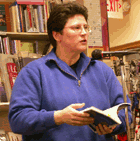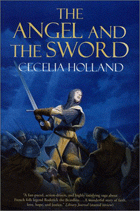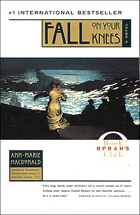 Writer/Reviewer Lori
L. Lake reviews Writer/Reviewer Lori
L. Lake reviewsEveryday Creative: 30 Ways to Wake Up Your Inner Artist by Eric Maisel; The Angel and the Sword by Cecelia Holland; and Fall on Your Knees by Ann-Marie MacDonald
|
 Everyday
Creative: 30
Ways to Wake up Your Inner Artist Everyday
Creative: 30
Ways to Wake up Your Inner Artistby Eric Maisel Red Wheel; Cards edition, 2004 ISBN: 159003077X Some time ago, I purchased a set of 48 playing-card-sized cards painted by Susan Seddon Boulet. I’ve kept them by my computer and occasionally dip into the deck, pull one out, and see if the colorful painting in some way inspires me in my writing. Now, with his new “A Little Every Day Decks,” creativity coach, writer, and psychologist Eric Maisel has given me an exciting new deck and a simple, easy-to-use program to spur creativity and inspiration. Each card contains a truth about creativity: “Grow creative by astonishing yourself” or “Grow creative by opening to serendipity,” for instance. The point of focus on each card is book-ended by ideas about the truth and then an exercise that can be done to enhance or change one’s experience and accessing of creativity. In an introductory section, Maisel tells us, “You can read through the thirty cards in your deck, pick out the one that feels particularly resonant, and try the simple exercise the card suggests. You can use the cards as a thirty-day program, taking in one message a day….You can shuffle the cards, cut the deck and let a random (is it really random?) message speak directly to you.” All of these are good ideas, and once you’ve gone through the deck, I have a hunch it will pay off to go through it again. And again. I’ve been examining and pondering the meanings of the cards for a couple weeks now and have settled upon using one each day at random before I begin my writing. In just a little over two weeks, I find that each morning I am anticipating reading the next card. Often the idea contained within stays with me all day, firing me on to carry out my appointed tasks. The cards are not just for writers or artists but for anyone seeking to expand, explore, or open up channels of creativity. Highly recommended. |
 The Angel and the Sword The Angel and the Swordby Cecilia Holland 304 pages, $14.95 Forge Books, 2001 ISBN: 0312868898 In the middle of the 9th century, a young girl lives in the royal castle in medieval Europe with her mother, the queen, and her dastardly father, Markold. The throne must pass through Queen Ingunn of Roderick’s bloodline. Because she has had no sons, her only child, Ragny, is the last descendant of the line. “Queen Ingunn had made a mistake, and paid for it all her life, but now, with her life gone, she saw a way to make amends” (p. 1). The queen lies on her deathbed. Her last wish in order to make amends is to see her estranged daughter—and to proclaim Ragny rightful heir to the throne as the new queen of Spain. Unfortunately, it is not to be for Markold holds sway over the soldiers and servants of the household. Though Markold does not keep Ingunn from giving Ragny a key piece of information, before the queen dies, he does prevent the proclamation of a new queen. Instead, he intends to marry Ragny, his daughter, and force her to bear a son of the Roderick line. Ragny is young, slender, almost boyish. She hasn’t fully bloomed to womanhood, and already she is facing dilemmas of the worst kind. She cannot stay with Markold and claim her rightful place and to flee is a risky proposition, but she chooses the latter course. With the king’s men hot on her trail, she begins a journey to Francia disguised as a young man named Roderick the Beardless. Little does she realize at first that she has allies her foes cannot even imagine. Despite her youth and inexperience, within Ragny beats the heart of a champion, a lover, and a just person, capable of inspiring others so long as she is attired as a man. What will happen if she drops the disguise? I read the first few pages of this historical drama/romance in the bookstore, was utterly hooked on this epic tale, and could hardly wait to get home and read more about this warrior princess with strange powers on her side. The twists and turns the story takes kept me reading long into the night. The cast of characters—priests, the French king, the Viking invaders, Frankish knights, and Seffrid, the sergeant charged by Markold to track down Ragny—are all well-drawn as are the battles and conflicts. Ragny’s journey, both external and internal, was illuminated with grace and power by an author clearly comfortable with bringing history to life. I loved this book! I’d have paid a lot closer attention to medieval history in college if it had been this mesmerizing. Highly recommended to anyone who loves a tale well told about knights and kings, lost princesses, and justice stolen and regained. |
 Fall on Your
Knees Fall on Your
Kneesby Ann-Marie MacDonald 512 pages, $14.00 Touchstone; Oprah edition 2002) ISBN: 0743237188 At heart, FALL ON YOUR KNEES is the family saga of Kathleen, Mercedes, Frances, and Lily, the daughters of James and Materia Piper who live in Cape Breton Island off Nova Scotia. But it is so much more—so big and ambitious that it’s very much a tour-de-force. This long, detailed novel builds and grows in power and tone, having a cumulative effect, so that by the time you get to the end, you feel you've been walloped with a big stick and fallen into a boggy pond where you are compelled to continue swimming in order to investigate and understand its power. The story begins in 1898 with James Piper and doesn’t end for some seven-plus decades. In the interim there are enough twists and turns to sink into melodrama, but the story never does that, perhaps because the author has real style which is unique and very different from the narrative techniques used in books nowadays. MacDonald writes from an omniscient viewpoint, going in and out of various consciousnesses, switching perspective and point of view with speed and grace. She breaks every rule I can think of with point of view and she gets away with it with style. I was impressed. It's very 19th century, and that was jarring to me at first, but I quickly became accustomed to the style. The first bit of the book was somewhat choppy, partly because of the narrative style and partly because MacDonald structured this book almost like a mystery. What are the secrets these girls hide? What do their cryptic experiences mean? MacDonald moves about in time, focuses on various characters (some of whom die unexpectedly), and the reader has to keep several character arcs floating all at once even though they come at you in a non-linear fashion. The middle hits a good stride that carries right through to the final pages. Once you get to the last couple of chapters, every little thing falls into place, and you can’t help but feel you've been on a major journey! The characterization of James, the father in the family, is one of the clearest, most sympathetic, and ultimately maddening descriptions of an utter monster of a man that I have ever seen. When I've read about abusive characters in other books—for instance, Daddy Glen in Dorothy Allison's BASTARD OUT OF CAROLINA—it was much easier to see the character as a cruel, irredeemable monster for whom I felt no sympathy. James, on the other hand, is rounded out in such a way that although he commits evil, horrible deeds, I saw him as acting out of ignorance, pain, and fear. He seemed believable. He seemed all too real. In other words, I didn't see him as evil through and through. And I saw some level of redemption for him at the end. About halfway through, MacDonald writes: “But memory plays tricks. Memory is another word for story, and nothing is more unreliable” (p. 255). In the same way that no one’s memories are absolutely accurate, neither are those of the characters about whom she writes. They misremember, in effect lying to themselves and to others. Failure to correctly recall or failure to remember at all becomes a theme throughout as characters attempt to protect themselves or others from the pain and horrors they’ve experienced. There were other key thematic issues that also struck me: women really got a raw deal in the past; men also got a raw deal, but they were not nearly so constrained as women; war crippled men in ways that weren't observable on the outside; physical and sexual abuse scar not just the victim, but also the perpetrator and everyone else in a family; many habits brought over from the Old Country (and ANY Old Country counts) did not translate well into more modern cultural practices; economic pressures took a serious toll on families, as did war; people close to one another, even when they love one another desperately, can do awful things to one another; and people who lived in the past sometimes had simply horrible lives that came to a bad end for no good reason at all. MacDonald has a great way with tone and managed to make the book extremely atmospheric—sometimes spooky, sometimes suspenseful, and curiously maddening because she makes the reader wait to get answers to questions one would naturally end up wondering along the way. Her use of language, metaphor, and simile was quite wonderful at times, and it's her steady accretion of images and details that really accentuates the tragedies and events in this complex and fascinating novel. This is one of those books I will probably always remember. It strikes me as exactly the sort of book that should be read in colleges forevermore. It's every bit as good as works by Piercy, Atwood, Tyler, and Morrison. Outstanding debut novel by a talented Canadian writer. |